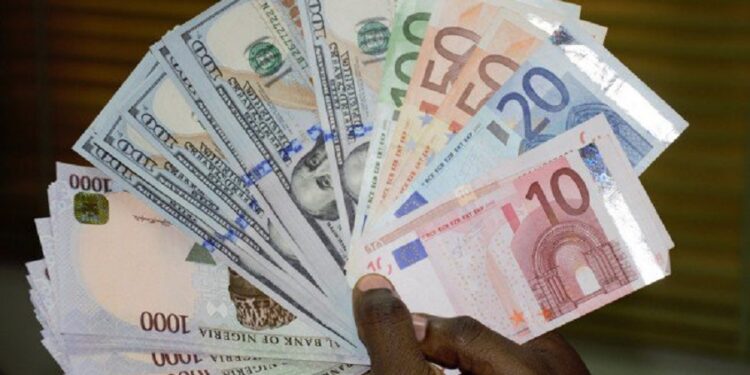The Nigerian naira clawed back a high degree of previous losses against the British pound this year at the unofficial market as inflows by FPIs and growing confidence in the local currency amplified its bullish momentum.
The naira on Thursday settled at N1593 against the British pound showing a gain of N821 from its February 24, 2024, low of N2414 against the quid.
The bullish pound persisted above the one-week high of 1.2660 against the US dollar in Thursday’s early New York session, however that couldn’t deter the Nigerian naira upsides against the Pound.
Recent price action shows the UK economy is on course to resume growth after entering a technical recession in the second half of 2023, according to the latest economic indicators.
The summary of the FX auction in Nigerian market on Thursday revealed that the Naira strengthened by 0.62 percent as the dollar was quoted at N1,255.07 against the dollar, stronger than N1,262.85 quoted on Wednesday at NAFEM.
Stronger Naira
- Following the Central Bank of Nigeria’s reforms, the country’s currency has consistently appreciated against the US dollar and other foreign currencies since the first week of March 2024.
- Currency dealers in Nigeria’s foreign exchange market attributed the stronger naira in the parallel market to decreased speculation as foreign exchange hoarders unloaded their holdings, following the Central Bank of Nigeria’s FX policy measures.
- Following the Central Bank of Nigeria’s (CBN) decision to pay out all verified foreign exchange backlogs (including the final tranche of $1.5 billion), the naira had bounced on gains coupled with improved market liquidity.
Controlling inflation
- As part of measures to control inflation and stabilize the Naira, the CBN last month raised its benchmark interest rate, known as the Monetary Policy Rate (MPR) by 200 basis points to 24.75 percent from 22.75 percent in February 2024.
- The CBN eased limitations on the sales of interbank proceeds and eliminated any ceilings on the spread of interbank foreign exchange transactions.
- Additionally, the payment of Business Travel Allowance (BTA) and Personal Travel Allowance (PTA) was limited by the CBN to electronic channels alone.
Given the CBN’s decision to raise the Monetary Policy Rate (MPR) by 200 basis points to 24.75 percent and its ongoing efforts to absorb liquidity and draw in more capital through increased Open Market Operations (OMO) sales, the naira is expected to continue its upward trend soon.
What you should know
Driven by strong domestic demand, the UK’s Manufacturing PMI unexpectedly increased in March after declining for 20 consecutive months. Business optimism reached a record high since April 2023 because of robust factory data in the UK, with 58% of manufacturers anticipating higher production levels in the upcoming year.
Furthermore, the pace at which British home prices increased in March was 1.6%, the fastest since December 2022, indicating that the real estate market is enduring historically higher interest rates.
Market expectations regarding rate cuts by the Bank of England will steer the value of the pound sterling in the mid-term. With UK inflation steadily declining, investors anticipate that the BoE will begin its rate-cutting cycle in June. According to Governor Andrew Bailey of the Bank of England, two or three rate cuts are reasonable for the entire year.
However, according to S&P Global Rating’s most recent analysis, show the British pound faces significant long-term challenges. The report stated that the next British government will need to exercise caution to prevent further damage to the nation’s already low credit rating given the severe strain on the public finances.






















